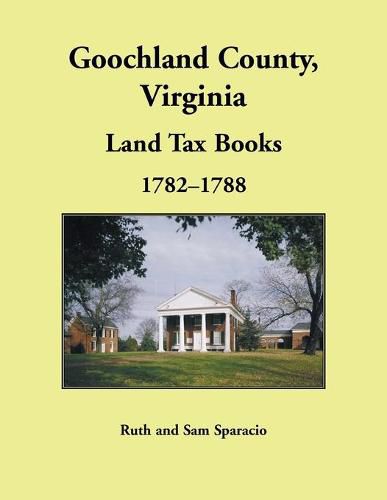Readings Newsletter
Become a Readings Member to make your shopping experience even easier.
Sign in or sign up for free!
You’re not far away from qualifying for FREE standard shipping within Australia
You’ve qualified for FREE standard shipping within Australia
The cart is loading…






This title is printed to order. This book may have been self-published. If so, we cannot guarantee the quality of the content. In the main most books will have gone through the editing process however some may not. We therefore suggest that you be aware of this before ordering this book. If in doubt check either the author or publisher’s details as we are unable to accept any returns unless they are faulty. Please contact us if you have any questions.
Goochland County, Virginia Land Tax Books, 1782-1788 contains entries from Goochland County Land Tax Book 1782-1817 beginning on page 1 and ending on page 95 for February/March 1782 through August 11, 1788.
Land tax records contain the name of the property owner, quantity of land owned, location of land, amount of tax imposed, or changes in ownership. By comparing land tax records from year to year, it may be possible to determine social, economic, and agricultural history, and possibly the status of certain individuals or groups of landowners within a locality.
For genealogical researchers, land tax records may help distinguish between individuals by the same name living in a locality at the same time. Men with the same name can be differentiated between by their location or by owning different acreage.
Land tax records are a substitute for records in those counties where destruction of the original deeds, wills and other records has occurred. By studying the lists from year to year, the researcher may trace an ancestor to determine the date of departure from the locality, or possibly, the year of death. The name of a taxpayer will continue on the tax list, noted as deceased or estate, until the estate is settled. Careful reading of marginal notes and the entries for other taxpayers who might have inherited or received land from the deceased’s estate can help support evidence about genealogical relationships gathered from other sources. A full-name index adds to the value of this work.
(1997), 2021, 81/2x11, paper, index, 112 pp
$9.00 standard shipping within Australia
FREE standard shipping within Australia for orders over $100.00
Express & International shipping calculated at checkout
This title is printed to order. This book may have been self-published. If so, we cannot guarantee the quality of the content. In the main most books will have gone through the editing process however some may not. We therefore suggest that you be aware of this before ordering this book. If in doubt check either the author or publisher’s details as we are unable to accept any returns unless they are faulty. Please contact us if you have any questions.
Goochland County, Virginia Land Tax Books, 1782-1788 contains entries from Goochland County Land Tax Book 1782-1817 beginning on page 1 and ending on page 95 for February/March 1782 through August 11, 1788.
Land tax records contain the name of the property owner, quantity of land owned, location of land, amount of tax imposed, or changes in ownership. By comparing land tax records from year to year, it may be possible to determine social, economic, and agricultural history, and possibly the status of certain individuals or groups of landowners within a locality.
For genealogical researchers, land tax records may help distinguish between individuals by the same name living in a locality at the same time. Men with the same name can be differentiated between by their location or by owning different acreage.
Land tax records are a substitute for records in those counties where destruction of the original deeds, wills and other records has occurred. By studying the lists from year to year, the researcher may trace an ancestor to determine the date of departure from the locality, or possibly, the year of death. The name of a taxpayer will continue on the tax list, noted as deceased or estate, until the estate is settled. Careful reading of marginal notes and the entries for other taxpayers who might have inherited or received land from the deceased’s estate can help support evidence about genealogical relationships gathered from other sources. A full-name index adds to the value of this work.
(1997), 2021, 81/2x11, paper, index, 112 pp